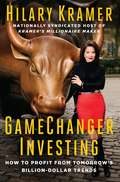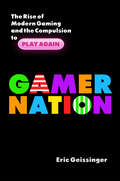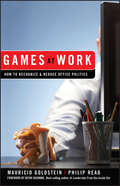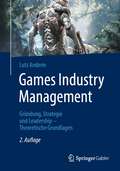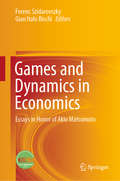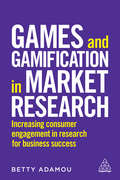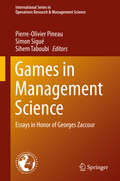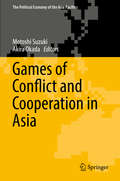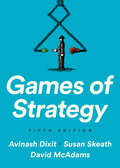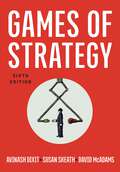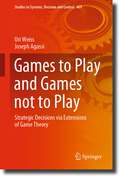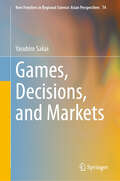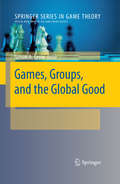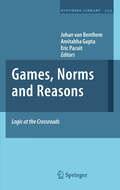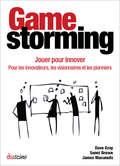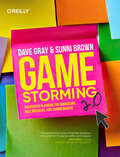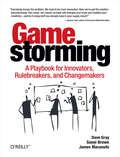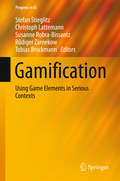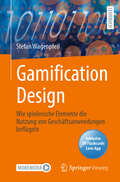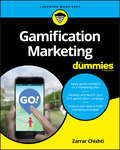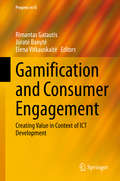- Table View
- List View
GameChanger Investing: How to Profit from Tomorrow's Billion-Dollar Trends
by Hilary KramerInvestment analyst and portfolio manager Hilary Kramer—called "a one-woman financial investment powerhouse" by Financial Times—provides a blueprint for investors to navigate the rapidly changing trends in today's economy. Kramer&’s investment style puts her ahead of the curve as she relentlessly researches to find the next big company to invest in long before anyone else does. In doing so, over the past three decades, she has generated more than $100 billion in wealth for people by putting in the hard work for them, the old-fashioned way—researching and analyzing the fundamentals of a stock, one company at a time. Using that same strategy, GameChanger Investing helps readers navigate the current political climate, understand the enormous potential Trump has for creating wealth, and offers up 10 investable trends and 24-must-own stocks that will make you rich through a second Trump term. A graduate of Wellesley College and The Wharton School of Business, Kramer began her career in the investment banking division of Morgan Stanley, making her first million dollars by age 30 and retiring at age 37. Now, she&’s helping engaged investors get rich too.
Gamechangers
by Peter FiskShake up and redefine the market by changing your game!A new generation of businesses is rising out of the maelstrom of economic and technological change across our world. These companies are shaking up the world. In Gamechangers Peter Fisk has sought out the brands and businesses, large and small, from every continent, who are changing the game... and shows how we can learn the best new approaches to strategy and leadership, innovation and marketing from them. 'Gamechangers' are disruptive and innovative, they are more ambitious, with stretching vision and enlightened purpose. They find their own space, then shape it in their own vision. Most of all they have great ideas. They outthink their competition, thinking bigger and different. They don't believe in being slightly cheaper or slightly better. Why be 10% better, when you could be 10 times better? Gamechangers is built around 10 themes that are shaping the future of business, brought to life with 100 case studies from across the world, and 16 practical canvases to make the best ideas happen in your business. The book is supported by a range of seminars, workshops and digital resources. Gamechangers offers guidance on: Thinking smarter and acting faster Embracing the new tricks of business Understanding how gamechangers dream and disrupt Delivering practical results and winning
Gamer Nation: The Rise of Modern Gaming and the Compulsion to Play Again
by Eric GeissingerA tech-industry insider takes a critical look at the effect games are having on our short- and long-term happiness and assesses the cultural prospects of a society increasingly obsessed with gaming.The American "game economy" has become an enormous enterprise, devouring roughly one-ninth of America's entire economic output. This overview of arguably the most influential segment of the entertainment industry examines the perspectives of gaming enthusiasts, addicts, designers, arcade owners, psychologists, philosophers, and more. Weighing the positive and negative aspects of games, the author considers their effect not only upon the players but upon culture and society. What trade-offs are being made when people play games for twenty-plus hours a week? The author puts particular emphasis on Candy Crush, whose enormous popularity has left all other games far behind. Since 2013 it has been installed over a billion times and its simplicity has disrupted previous game-design assumptions, proving new games don't have to be sophisticated and graphically immersive. He also offers insights from interviews with experts on the mechanics of manipulation. Sophisticated psychological tools are used to design games that are compelling, irresistible, and possibly addicting. In a few case, obsessive game-playing has been the cause of death. Whether you enjoy games as a harmless pastime or are suspicious of their effects on the quality of your family's life, you'll want to read this wide-ranching exploration of the growing game phenomenon.
Gamers on Top: What to Expect from Gamers as Executives
by John C. Beck Mitchell WadeData has shown that young people who grew up on video games--the gamer generation--actually exhibit skills and behaviors that can be valuable to the organizations they work for. But at some point, gamers will also become CEOs and other senior executives, leading the economy through the retirement of many boomers. Are they up to the challenge? In this chapter, the author looks at some of the key traits of the gamer generation and discusses why these will translate into great leadership. This chapter is excerpted from "The Kids Are Alright: How the Gamer Generation Is Changing the Workplace."
Games At Work
by Kevin Cashman Phil Read Mauricio Goldstein"A terrific read not only for senior leaders and executives but also for employees seeking growth in complex organizations. Goldstein and Read dissect the interpersonal dynamics that affect a company's performance, provide a framework to understand the games that are commonly played in businesses around the world, and offer practical tools to correct these behaviors and improve the organization's effectiveness."--Jacopo Bracco, executive vice president, DIRECTV Latin America"Whether you are an employee, manager, or CEO, this book will help you uncover the games that are going on around you and in your organization and will arm you with strategies to combat the negative effects of these games."--Corey J. Seitz, vice president, global talent management, Johnson & Johnson"This book is a good warning sign for organizational life. A road map of potholes and wrong turns. Written in a clear and down-to-earth way, its strength is its concreteness."--Peter Block, author, Community: The Structure of Belonging"Play or don't play, your choice. But if you need to manage and aspire to lead, you must read Goldstein and Read's helpful treatment of the games going on all around you all the time. Prepare to be entertained and disconcerted in equal measure."--Seán Meehan, Martin Hilti Professor of Marketing and Change Management, IMD"Goldstein and Read provide an accessible and penetrating discussion of the twenty-two most common games at work and their individual and organizational causes, business costs, and remedies. Every working person who has ever been a victim or perpetrator of political games will profit from reading Games at Work."--Harvey A. Hornstein, emeritus professor of psychology; former director of Columbia University Organizational Development Programs; and organizational consultant
Games Industry Management: Gründung, Strategie und Leadership – Theoretische Grundlagen
by Lutz AnderieDieses Buch dokumentiert und analysiert die marktorientierte Unternehmensführung in der Games-Branche sowie die damit einhergehenden Managementprozesse. Unternehmensgründungen werden unter branchenrelevanten Aspekten dargestellt, die Erstellung von Businessplänen, das Gewinnen von Pitches sowie die Möglichkeiten der Unternehmensfinanzierung, auch durch Förderprogramme, werden aufgezeigt und durch konkrete Handlungsempfehlungen abgerundet. Die Zusammenstellung von Teams einschließlich der Aspekte des Female Managements und Diversity sowie die erfolgsorientierte Unternehmensführung werden praxisnah erläutert. Zahlreiche strategische und taktisch-operative Analysen, die für die erfolgreiche Vermarktung von Videogames entscheidend sind, werden anhand von über 100 Fallbeispielen dokumentiert. Managemententscheidungen, einschließlich der Games-Unternehmen Tencent, Electronic Arts, Ubisoft, Crytek, Plaion, Deck 13 und Microsoft, werden im Kontext des unternehmerischen Erfolgs beleuchtet. Künstliche Intelligenz, Neuronale Netzwerke, Bilderkennung, Spracherkennung und Chatbots in Computerspielen werden verständlich erklärt. Monetarisierungsmodelle, Spielökonomien, Blockchain und Non-Fungible Tokens (NFTs) werden ebenso erläutert wie KI-basierte Planung & Prognosemodelle für In-Game Items. Die Vertriebskanäle und Businessopportunitäten für Online- und Mobile Games sowie E-Sports und Serious Games werden aufgezeigt. Aktuelle Entwicklungen im Game Design, bei Game-Engines, dem Game Hacking und bei Gamification werden dokumentiert. Ein einzigartiges Fachbuch, der bereits in der 2. Auflage veröffentlicht wird, für Studierende mit Schwerpunkt Games Management, aber auch für Unternehmensgründer, Manager und Investoren der Games-Branche.
Games and Dynamics in Economics: Essays in Honor of Akio Matsumoto
by Ferenc Szidarovszky Gian Italo BischiThis book focuses on the latest advances in nonlinear dynamic modeling in economics and finance, mainly—but not solely—based on the description of strategic interaction by using concepts and methods from dynamic and evolutionary game theory. The respective chapters cover a range of theoretical issues and examples concerning how the qualitative theory of dynamical systems is used to analyze the local and global bifurcations that characterize complex behaviors observed in social systems where heterogeneous and boundedly rational economic agents interact. Nonlinear dynamical systems, represented by difference and differential and functional equations, are extensively used to simulate the behavior of time-evolving economic systems, also in the presence of time lags, discontinuities, and hysteresis phenomena. In addition, some theoretical issues and particular applications are discussed, as well. The contributions gathered here offer an up-to-date review of the latest research in this rapidly developing research area.
Games and Gamification in Market Research: Increasing Consumer Engagement in Research for Business Success
by Betty AdamouGames are the most engaging medium of all time: they harness storytelling and heuristics, drive emotion and push the evolution of technology in a way that no other platform has or can. It's no surprise, then, that games and gamification are revolutionizing the market research industry, offering opportunities to reinvigorate the notoriously sluggish engagement levels seen in traditional surveying methods. This not only improves data quality, but offers untapped insights unattainable through traditional methods. Games and Gamification in Market Research shows readers how to design ResearchGames and Gamified Surveys that will intrinsically engage participants and how best to use these methodologies to become, and stay, commercially competitive. In a world where brands and organizations are increasingly interested in the feelings and contexts that drive consumer choices, Games and Gamification in Market Research gives readers the skills to use the components in games to encourage play and observe consumer behaviours via simulations for predictive modelling. Written by Betty Adamou, the UK's leading research game designer and named as one of seven women shaping the future of market research, it explains the ways in which these methodologies will evolve with technologies such as virtual reality and artificial intelligence, and how it will shape research careers. Alongside a companion website, this book provides a fully immersive and fascinating overview of game-based research.
Games in Economic Development
by Bruce WydickGames in Economic Development examines the roots of poverty and prosperity through the lens of elementary game theory, illustrating how patterns of human interaction can lead to vicious cycles of poverty as well as virtuous cycles of prosperity. The book shows how both social norms and carefully designed institutions can help shape the "rules of the game," making better outcomes in a game possible for everyone involved. The book is entertaining to read, intended for a broad audience, and can be accessed with little background in development economics or game theory. Its chapters explore games in natural resource use; education; coping with risk; borrowing and lending; technology adoption; governance and corruption; civil conflict; international trade; and the importance of networks, religion, and identity, illustrating concepts with numerous anecdotes from recent world events. An appendix explaining basic ideas in game theory used in the book is provided for interested readers.
Games in Management Science: Essays in Honor of Georges Zaccour (International Series in Operations Research & Management Science #280)
by Pierre-Olivier Pineau Simon Sigué Sihem TaboubiThis book covers a large spectrum of cutting-edge game theory applications in management science in which Professor Georges Zaccour has made significant contributions. The book consists of 21 chapters and highlights the latest treatments of game theory in various areas, including marketing, supply chains, energy and environmental management, and cyber defense. With this book, former Ph.D. students and successful research collaborators of Professor Zaccour wish to honor his many scientific achievements.
Games of Conflict and Cooperation in Asia
by Motoshi Suzuki Akira OkadaThis edited volume is an outcome of the first major collaborative project between Japanese economists and political scientists, funded by the Japan Society for the Promotion of Science. The authors of the individual chapters show that Asian states play games of conflict and cooperation strategically by creating, changing, or destroying institutions. For them, conflict and cooperation are inseparable phenomena and are integral parts of states' strategic interactions under constraints. Through the establishment of appropriate institutions that coordinate states' actions, present conflict can be turned into stable cooperation in the future. No discernible difference exists in the extent of rationality between the East and the West, but substantial variations between regions or even within a region are found in institutions that are influenced by history and culture. Historical and cultural variations divide contemporary Asia, making regional institutional cooperation difficult and prompting some Asian states to use global or inter-regional arrangements in order to obtain benefits of cooperation. Qualifications are provided for this line of argument in the first chapter, which also discusses the affinity of international relations theory and game theory, with special attention to Japan and Asia. The following ten substantive chapters are developed based on the conceptual framework and, for integrity and coherence, are sub-grouped into four parts that correspond to major issues in international relations scholarship: (1) conflict management, (2) arms control, (3) trade, and (4) currency.
Games of Strategy (Fifth Edition): Instructor's Manual
by Avinash K. Dixit Susan Skeath David McAdamsComprehensive, clear, and approachable, with clever real-world examples that motivate students Games of Strategy is beloved by students and instructors alike for its flexible organization, focus on problem-solving, and engaging and accessible examples from diverse fields, like political science, biology, and business. The completely revised Fifth Edition adds the work of David McAdams, especially in the areas of market design and auction theory, and provides new insights into diverse applications, such as billion-dollar buy-outs, job offer negotiation, the Cuban Missile Crisis, and collusion in the school milk market.
Games of Strategy (Sixth Edition)
by Avinash K. Dixit Susan Skeath David McAdamsInvites all students to understand game theory From the minds of renowned economists Avinash Dixit, Susan Skeath, and David McAdams comes the Sixth Edition of the most approachable game theory text, rooted in rigorous research and engaging examples. Assuming no prior knowledge of game theory—only a principles level of economic education—and exposure to only high-school level algebra, this book’s examples appeal to students of all different interests and experiences while maintaining an empirical approach. The new edition applies game theory to topics like digital currency, trade relations, grade inflation, strategy in voting rules, and interactions between the FED and Congress. This purchase offers access to the digital ebook only.
Games of Strategy: An Introduction
by Vijay KrishnaAn introduction to the formal analysis of strategic situations. Ideas of game trees, backwards induction, and dominated strategies are introduced. The methods of backwards induction to find optimal strategies is related to the method of successive eliminations of dominated strategies for games of perfect information.
Games to Play and Games not to Play: Strategic Decisions via Extensions of Game Theory (Studies in Systems, Decision and Control #469)
by Joseph Agassi Uri WeissThis book contributes to the theoretical discussions of equilibria that rest on error―in which we include mistaken choices of games to play. Extant game theory recommends diverse strategies (plans of actions) for various given games, particularly those in Nash equilibria, in which no player benefits from one-sided strategy alteration. The literature also refers to the design of games that fit given goals. This is the mechanism design theory; its function is to serve social planners ignorant of the preferences of the people intended to play them.Our study of games avoidance adds to game theory the meta-game of choosing what game to play and what game to avoid playing, and that both players and planners can generate. This comprises a shift from the maximalist position that aims to maximize possible profit to the minimalist one that aims at minimizing possible loss. This shift depends on the question, considering the public interest, what set of games is it advisable to encourage? Obviously, it is advisable to encourage playing some groups of games such as trade, as well as to discourage playing other groups of games such as wars. This shift makes the theory much more applicable to social science: usually, choosing what game to play is less practical than choosing what game not to play. This invites legislation and similar incentives; their study should aim at the improvement of their usefulness.Discussing the possibility of changing both game and strategy renders game theory part-and-parcel of social science. For this mathematical models will not do: it requires a clear distinction between describing options and explaining situations. Explanations may enhance efforts at improvement.
Games, Decisions, and Markets (New Frontiers in Regional Science: Asian Perspectives #74)
by Yasuhiro SakaiThis book critically discusses the historical backgrounds and new developments of the theories of games, decisions, and markets, with many possible applications to social and economic problems. Consisting of three connected parts, the book sheds new light on the role of merchants in the market economy under conditions of risk and uncertainty. Part I begins with the question of why and how John von Neumann and Oskar Morgenstern did joint work in game theory, namely, the theoretical study of strategic interactions among several decision makers. The duel between Sherlock Holmes and Professor Moriarty in Conan Doyle's famous detective story is recalled as a great inducement to Neumann and Morgenstern to invent zero-sum, two-person games. More general non-zero-sum games and associated Nash solutions are then discussed in relation to the generation-gap problem between a young couple and an elderly couple. Part II explores a set of very fundamental problems of individual decision making. Thetwo famous axioms of revealed preference ― Samuelson's weak axiom and Houthakker's axiom ― are skillfully connected and empirically reevaluated by the introduction of certain regularity conditions. The revealed preference approach is then extended from the original commodity space to the dual price space. Such dual treatment in microeconomics is further applied to the theory of cost and production, with the decomposition of the total factor price effect into the substitution and scale effects. Part III turns the reader’s attention to the interdependence of several markets. The almost forgotten Hicks–Morishima approach is newly revived with graphical illustrations of traded goods. The well-known Jones–Kemp approach to international trade is boldly expanded into the world of risk and uncertainty. Some striking results in comparative static analysis are derived, with favorable implications for the real world.
Games, Groups, and the Global Good
by Simon A. LevinHow do groups form, how do institutions come into being, and when do moral norms and practices emerge? This volume explores how game-theoretic approaches can be extended to consider broader questions that cross scales of organization, from individuals to cooperatives to societies. Game theory' strategic formulation of central problems in the analysis of social interactions is used to develop multi-level theories that examine the interplay between individuals and the collectives they form. The concept of cooperation is examined at a higher level than that usually addressed by game theory, especially focusing on the formation of groups and the role of social norms in maintaining their integrity, with positive and negative implications. The authors suggest that conventional analyses need to be broadened to explain how heuristics, like concepts of fairness, arise and become formalized into the ethical principles embraced by a society.
Games, Norms and Reasons
by Johan Van Benthem Eric Pacuit Amitabha GuptaGames, Norms, and Reasons: Logic at the Crossroads provides an overview of modern logic focusing on its relationships with other disciplines, including new interfaces with rational choice theory, epistemology, game theory and informatics. This book continues a series called "Logic at the Crossroads" whose title reflects a view that the deep insights from the classical phase of mathematical logic can form a harmonious mixture with a new, more ambitious research agenda of understanding and enhancing human reasoning and intelligent interaction. The editors have gathered together articles from active authors in this new area that explore dynamic logical aspects of norms, reasons, preferences and beliefs in human agency, human interaction and groups. The book pays a special tribute to Professor Rohit Parikh, a pioneer in this movement.
Gamestorming - Jouer pour innover: A Playbook For Innovators, Rulebreakers, And Changemakers (O'reilly Ser.)
by James Macanufo Sunni Brown Dave GrayCe livre propose plus de 80 jeux avec des explications précises, accompagnés de dessins et croquis qui vous permettront de trouver des solutions en équipe à des problématiques auxquelles vous n’auriez peut-être jamais pensé.
Gamestorming 2.0: An Updated Playbook for Innovators, Rule Breakers, and Changemakers
by Sunni Brown Dave GrayIn today's environment of partial attention and isolating remote work, few things are more satisfying than group experiences that produce powerful, meaningful connections and output. But this kind of enlivening, collective work doesn't happen by chance. It must be consciously designed and purposefully activated--;in a team, an organization, and a culture. The good news is that making space for this kind of work doesn't have to be hard. There's a technique available to everyone, with no special certification required: gamestorming. This substantial update to the best-selling O'Reilly book now includes three new chapters and 95 games. The authors identified and curated techniques from some of the world's most innovative professionals as well as inventing games of their own. This book is the result: a unique collection of approaches to simultaneously ignite engagement and level-up creative teamship while bringing agility and structure to gatherings at work in person and online. Shorten meetings and make them significantly more productive Increase efficacy and engagement in strategic thinking and problem-solving Enhance connection and communication across team members Elevate collaboration and uncover surprising solutions to sticky problems Generate better ideas and significantly improve remote work experiences
Gamestorming: A Playbook for Innovators, Rulebreakers, and Changemakers (O'reilly Ser.)
by James Macanufo Sunni Brown Dave GrayGreat things don't happen in a vacuum. But creating an environment for creative thinking and innovation can be a daunting challenge. How can you make it happen at your company? The answer may surprise you: gamestorming.This book includes more than 80 games to help you break down barriers, communicate better, and generate new ideas, insights, and strategies. The authors have identified tools and techniques from some of the world's most innovative professionals, whose teams collaborate and make great things happen. This book is the result: a unique collection of games that encourage engagement and creativity while bringing more structure and clarity to the workplace. Find out why -- and how -- with Gamestorming.Overcome conflict and increase engagement with team-oriented gamesImprove collaboration and communication in cross-disciplinary teams with visual-thinking techniquesImprove understanding by role-playing customer and user experiencesGenerate better ideas and more of them, faster than ever beforeShorten meetings and make them more productiveSimulate and explore complex systems, interactions, and dynamicsIdentify a problem's root cause, and find the paths that point toward a solution
Gamification
by Rüdiger Zarnekow Christoph Lattemann Stefan Stieglitz Susanne Robra-Bissantz Tobias BrockmannThis compendium introduces game theory and gamification to a number of different domains and describes their professional application in information systems. It explains how playful functions can be implemented in various contexts and highlights a range of concrete scenarios planned and developed for several large corporations. In its first part the book presents the fundamentals, concepts and theories of gamification. This is followed by separate application-oriented sections - each containing several cases - that focus on the use of gamification in customer management, innovation management, teaching and learning, mobile applications and as an element of virtual worlds. The book offers a valuable resource for readers looking for inspiration and guidance in finding a practical approach to gamification.
Gamification Design: Wie spielerische Elemente die Nutzung von Geschäftsanwendungen beflügeln
by Stefan WagenpfeilGamification hat längst den Bereich der Computerspiele verlassen und ist zu einem wichtigen Werkzeug geworden, um Anwendungen zu entwickeln, die Benutzer*innen fördern, fordern und fesseln. In diesem Buch werden die Konzepte der Gamification, grundlegende Modelle und deren Anwendungsbereiche behandelt. Zudem erhalten Sie konkrete Handlungsempfehlungen und Herangehensweisen für die praktische Umsetzung. Sie benötigen keine Programmierkenntnisse, sollten jedoch Interesse an technischen und theoretischen Zusammenhängen mitbringen, um mithilfe von Gamification gezielt Ihre Anwendungen zu planen und umzusetzen. Erfahren Sie, wie Sie mit Gamification mehr Akzeptanz und Effizienz erreichen können. Das Lehrbuch führt ein solides wissenschaftliches Fundament ein, auf dem dann die tiefergehenden Konzepte angewandt und anhand diverser Fallbeispiele illustriert werden. Es eignet sich für Studierende der Informatik, Wirtschaftsinformatik oder Betriebswirtschaft (mit technischem Interesse), sowie IT-Manager, Software-Architekten oder Product Owner in Unternehmen. Zusätzliche Fragen per App: Laden Sie die Springer-Nature-FlashcardsApp kostenlos herunter und nutzen Sie exklusives Zusatzmaterial, um Ihr Wissen zu prüfen.
Gamification Marketing For Dummies
by Zarrar ChishtiGrow your customer base with games! Gamification is the practice of adding elements of gameplay into marketing materials to better engage customers. In Gamification Marketing For Dummies, you’ll learn to use this proven strategy to capture the attention of your target markets and boost your results using valuable gamification data. Games are fun! That’s why gamification is so successful—customers will jump at the chance to play and win your custom-developed marketing game. You’ll connect with your customers and create lasting memories. Whether or not you are digitally savvy, this book will teach you the basics of gamification, from choosing the right game to capturing the user behavior data that the game generates. Use games to increase customer engagement and marketing results Learn how to choose or commission the right games for your market Plan and execute a successful gamification strategy Learn from data generated inside your game for valuable market insights From simple strategies like customer loyalty programs to complex, branded, social game apps, this book will point in the direction of gamification that works for you.
Gamification and Consumer Engagement: Creating Value in Context of ICT Development (Progress in IS)
by Rimantas Gatautis Jūratė Banytė Elena VitkauskaitėIn the context of rapid ICT development, this book focuses on how gamification affects consumer engagement and can be used to create a shared value for customers and companies. Based on the constructs of shared value, consumer engagement and gamification, it creates a conceptual model and a research methodology to enable empirical testing and provide complex empirical research findings. The book demonstrates the use of game elements and the motivation to play games as a means of achieving a psychological effect, i.e., consumer engagement manifested through gamified activities and brand engagement. This joint empirical study, by an expert team, concludes that the analysis of consumer perceived value in the context of engagement in gamified activities should distinguish between not just the theoretically identified company/brand-related economic, emotional, functional and social values, but also between engagement-related social and functional values.
